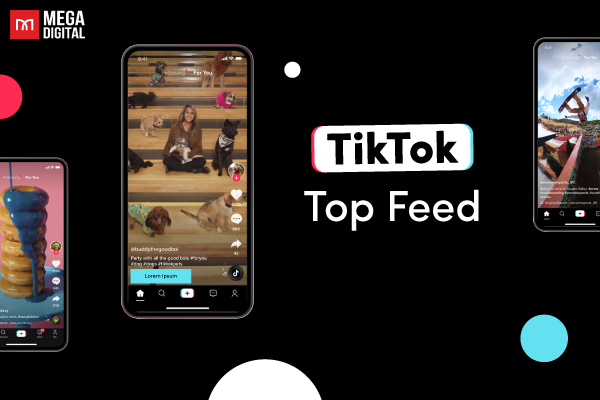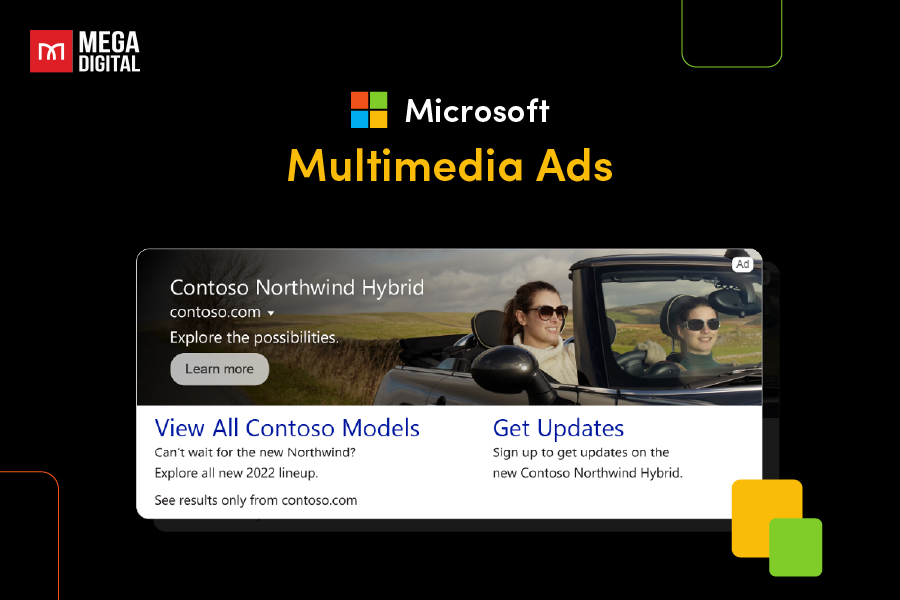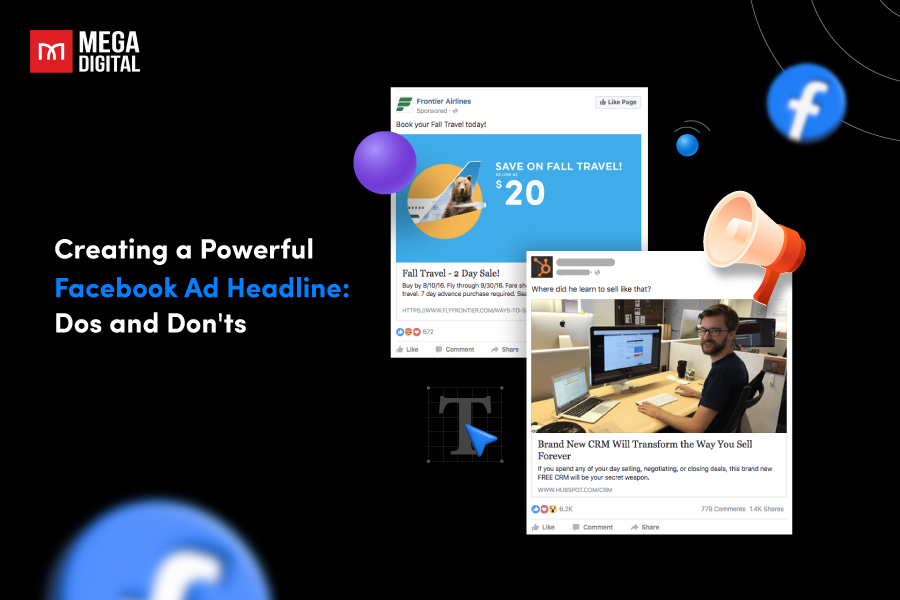Struggling to fill your rooms in today’s digital age? Travelers are just a click away, but how do you get your hotel noticed amongst the competition? Google Ads for hotels might be your secret weapon. This powerful tool can put your property directly in front of travelers actively searching, and help you turn clicks into booked rooms. In this blog post, I will explain what Google Hotel Ads are, its benefits, and some pro tips to help you utilize this strategy.
- What is Google Hotel Ads?
- Where Does Your Hotel Ads Appear in Google?
- Key Benefits of Google Ads for Hotels
- How Much Does Advertising a Hotel on Google Ads Cost?
- How to set up Google Hotel Ads?
- Step 1: Create a Google Hotel Center account
- Step 2: Set up your hotel price feed
- Step 3: Link your Hotel Center Account to a Google Ads account
- Step 4: Create a hotel campaign in Google Ads
- Step 5: Manage your budgets and bidding strategy
- Step 6: Create ad groups and set up ads
- Step 7: Monitor and optimize your Hotel ad campaign
- Mega Digital’s Pro Tips for Optimizing Google Ads for Hotels
- 3 Best Google Hotel Ads Examples
What is Google Hotel Ads?
Google Hotel Ads is a tool created by Google to help hotels boost their direct bookings and enhance their visibility on the search engine. Similar to other metasearch platforms like Trivago and TripAdvisor, Google Hotel Ads’ goal is to compare the rates of properties across various Online Travel Agencies (OTAs).
When a hotel launches a campaign with Google, its official website will also appear in the list. By clicking the link, potential guests can land on the hotel’s website and make a reservation directly through the booking engine.
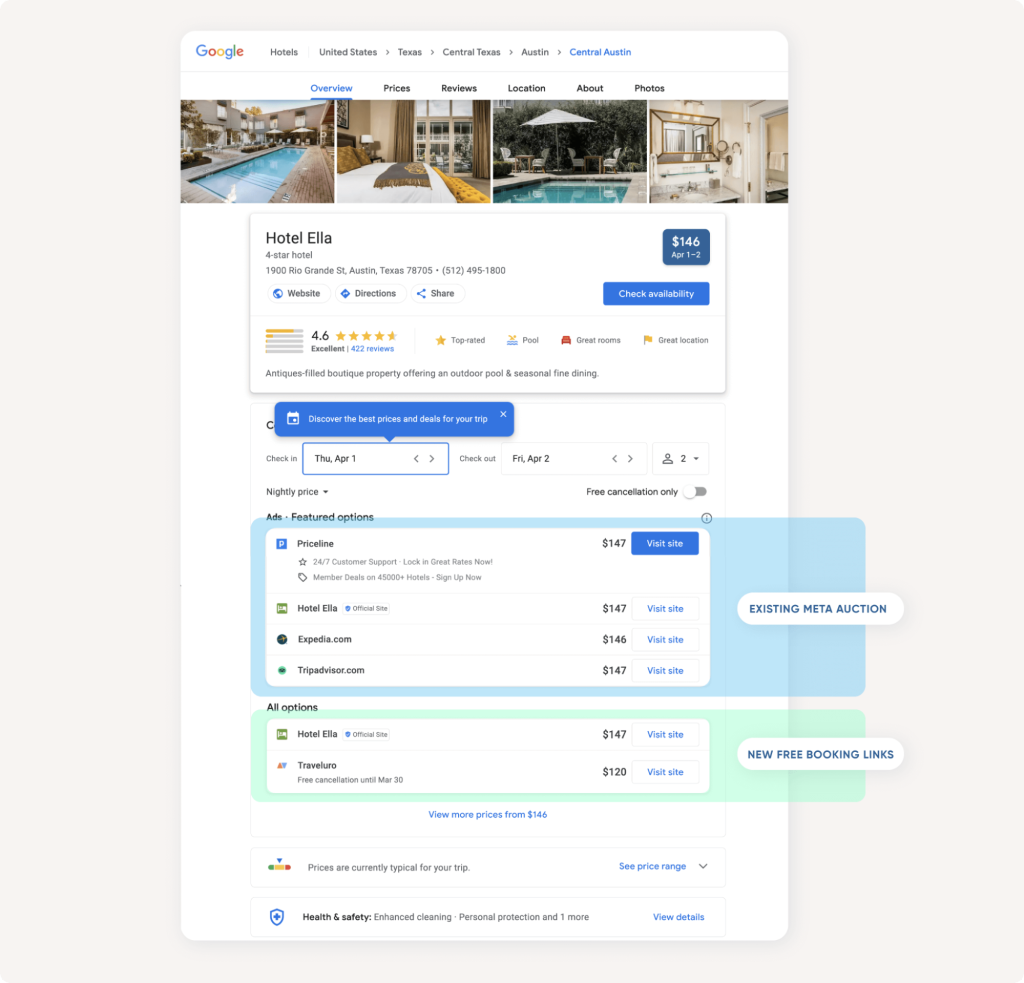
Clicking a hotel within the search unit on Google Search brings you to a detailed hotel page including the following information:
- The hotel’s name, category, address, and phone number are displayed, along with links to the hotel’s website or directions. This section also includes the average user rating, highlights, and a description of the hotel.
- A “Check Availability” button directs travelers to a comprehensive list of hotel booking links, which is also found under the “Prices” tab.
- The booking module showcases hotel booking links and a link to view more options, including free booking links in the “All Options” section. Travelers can modify prices based on their check-in and check-out dates, as well as the number of guests. You can set up your price list to adjust prices based on the traveler’s search criteria.
- A filter allows travelers to view prices by nightly rate, total nightly cost, or total stay cost, providing additional context to the hotel’s rates and fees. This option is also available for all hotel booking links in the “Prices” tab.
- Booking links direct travelers to a landing page for a hotel, Online Travel Agent (OTA), or metasearch engine where they can book a room at the chosen hotel. You can customize this link to include a small logo and highlight appealing hotel features or amenities. Clicks on these links are paid, and this section is marked with an “Ads” badge.
- Free booking links are listed under “All Options” within hotel searches.
Where Does Your Hotel Ads Appear in Google?
When a potential guest begins their search for a hotel, more often than not, their journey starts on Google. This could be through Google Search, Google Maps, or even YouTube. Here’s how your hotel appears in these platforms:
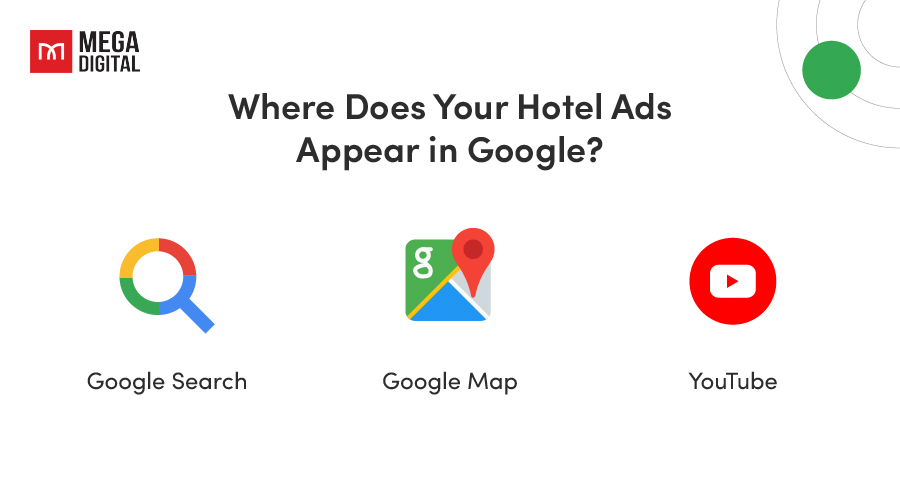
Google Search
When someone searches for a hotel on Google Search, a hotel search module appears in the search results. This module is a comprehensive display of hotels that match the search query. It includes hotel photos, names, prices, and a map showing the location of each hotel. This allows users to compare hotels at a glance without having to visit each hotel’s website individually.
Google Maps
Similarly, when a user searches for a hotel on Google Maps, they are presented with a list of hotels in the area they are looking at. Each hotel listing on the map includes the hotel’s name, its rating, and its price range. Users can click on a hotel to see more details, including photos, reviews, and the hotel’s exact location.
YouTube
While YouTube might not be the first platform that comes to mind when thinking about hotel searches, it’s becoming an increasingly popular tool for travelers. Hotels can appear on YouTube in the form of video ads, or in videos from travel vloggers and review channels. These videos can give potential guests a better feel for what the hotel is like in reality.
Key Benefits of Google Ads for Hotels
Here’s a breakdown of the key benefits Google Ads offers to elevate your hotel’s online presence and drive bookings:
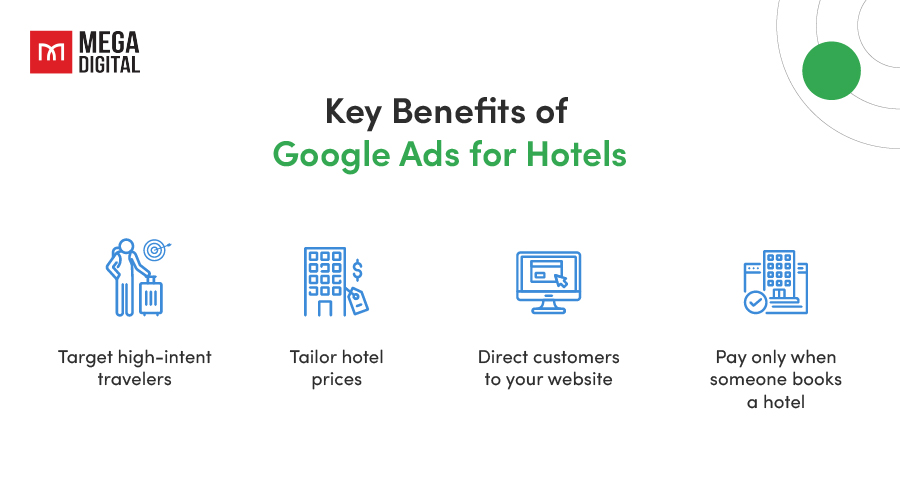
Target high-intent travelers
Reach travelers actively searching for hotels in your specific location. Google Ads allows for precise targeting based on user location, demographics, and even keywords related to specific types of stays. This ensures your ads are displayed to users who are already in the “consideration stage” of their travel planning, significantly increasing the likelihood of converting them into paying guests.
Tailor hotel prices
With Google Ads, you can tailor your hotel’s prices based on availability and traveler itineraries. This means you can adjust your prices to match demand, ensuring you maximize revenue during peak times and maintain occupancy during off-peak periods. This dynamic pricing strategy can significantly increase your hotel’s profitability.
Direct customers to your website
With Google Ads, you can direct customers straight to your website to make a booking. This not only simplifies the booking process for the customer but also allows you to avoid commission fees from third-party booking sites. By driving traffic directly to your website, you can also increase the chances of cross-selling additional services such as restaurant bookings or spa treatments.
Pay only when someone books a hotel
One of the most cost-effective features of Google Ads is that you only pay for an ad when someone books a hotel. Unlike traditional advertising with upfront costs, Google Ads operates on a pay-per-click (PPC) model. You only incur a cost when a user clicks on your ad. This means your marketing budget is being used efficiently, with every dollar spent resulting in a direct booking. Furthermore, Google Ads allows you to fine-tune your bidding by factors such as device type, the traveler’s country, or length of stay, giving you even more control over your advertising spend.
How Much Does Advertising a Hotel on Google Ads Cost?
Google Ads is a powerful platform that can significantly boost the visibility and profitability of your hotel. However, the cost of using Google Ads can vary greatly depending on several factors. Here’s what you need to know:
Google Hotel Ads Cost
The cost of Google Ads for hotels is not fixed and can vary based on several factors such as the type of ads you’re running, the localized competition, the keywords you’re targeting, and more. Some services charge a monthly fee based on the number of units your property has. For example, if you have 10 or fewer units, the price could be around $29 per month.
Google Hotel Ads Commission
Google Ads for hotels operates on a commission-based model. This means you only pay when a valid hotel booking is made. The commission rate is set by you in Google Ads and represents how much revenue you’re willing to spend on hotel ads for each dollar that you earn from bookings.
From April 30, 2024, the bid strategies of Commissions (per Stay) and Commissions (per Conversion) will no longer be available for new Hotel ad campaigns. However, active Hotel ad campaigns with commissions-based bid strategies will remain operational until October 31, 2024.
How to set up Google Hotel Ads?
Before you get started, ensure you have the necessary information readily available:
- Hotel website and booking system: You’ll need a user-friendly hotel website with a functional booking engine. Google Ads for hotels require seamless integration with your booking system to display accurate rates and availability.
- High-quality photos and descriptions: Compelling visuals showcasing your hotel’s best features and engaging descriptions highlighting amenities and unique offerings are crucial for attracting potential guests.
- Google Ads account: If you don’t already have one, you’ll need to create a free Google Ads account.
Setting up Google Ads for hotels involves several steps, each designed to ensure that your hotel’s ads are effective and reach the right audience. Here’s a step-by-step guide on how to set up Google Hotel Ads:
Step 1: Create a Google Hotel Center account
The first step is to create a Google Hotel Center account. Google Hotel Center is a central platform where you manage your hotel’s data, rates, and availability across Google.
Head over to https://hotelcenter.google.com/ and create a Hotel Center account (if you don’t have one already). Here, you’ll upload your hotel information, including property details, rates, and room descriptions.
Step 2: Set up your hotel price feed
Next, you’ll need to set up your hotel price feed. This feed will provide Google with up-to-date information about your hotel’s rates and availability.
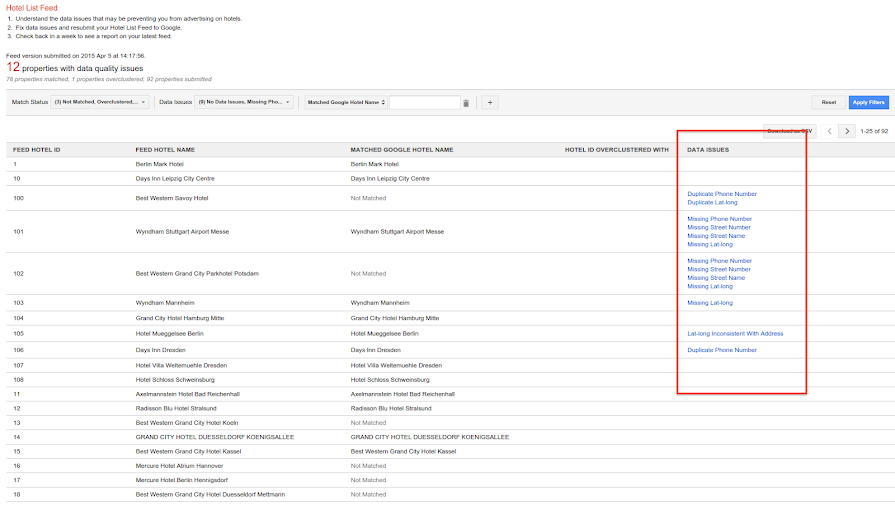
Step 3: Link your Hotel Center Account to a Google Ads account
Once your Hotel Center account is set up, you’ll need to link it to a Google Ads account. This will allow you to create and manage your hotel ad campaigns.
Navigate to your Google Ads account and select ‘Tools & Settings’. Under ‘Tools & Settings’, choose ‘Linked accounts’ and then select ‘Details’ under the ‘Google Hotel Center’ section.
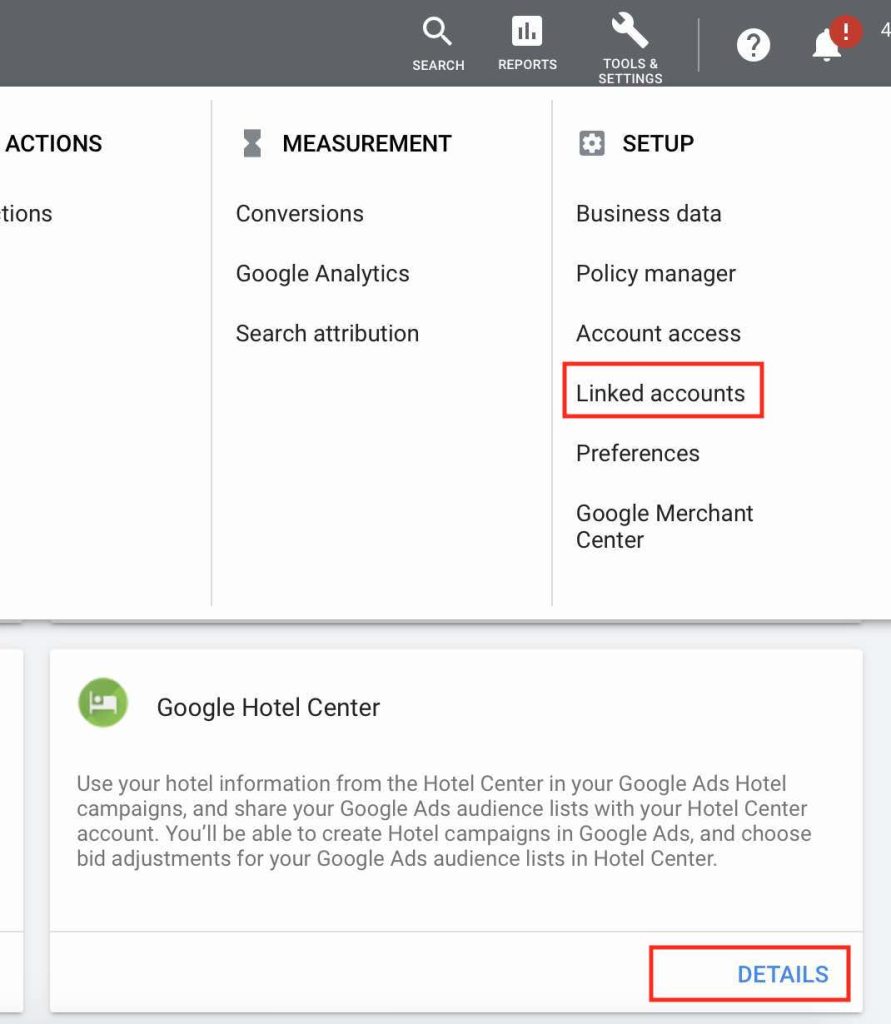
Next, click on the blue ‘+’ button. Enter your Hotel Center Account ID and click ‘Send’.
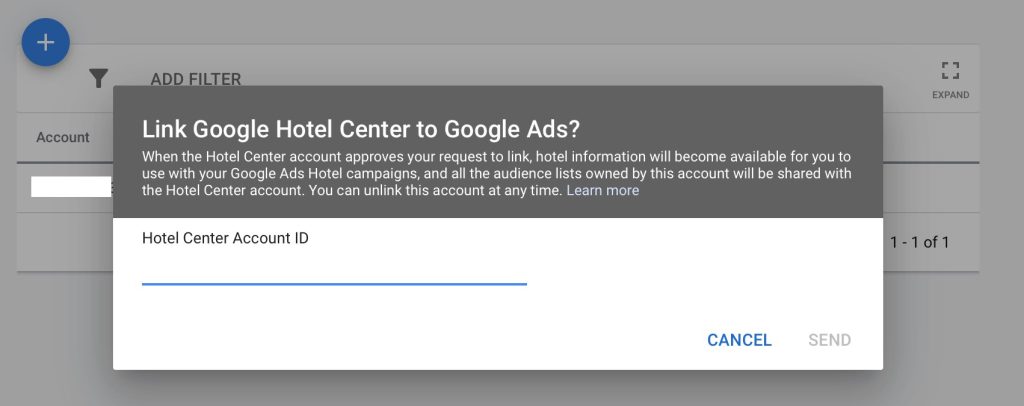
The request will be sent to the hotel center account, and once it’s accepted, your Google Ads account will be connected to the Google Hotel Center account.
Now you can start creating campaigns from Google ads.
Step 4: Create a hotel campaign in Google Ads
The next step is to create a hotel campaign in Google Ads. This campaign will determine how and where your hotel’s ads are displayed.
Log in to your Google Ads account and navigate to the “Campaigns” section. Click on “New Campaign” and choose the “Create a campaign without a goal’s guidance” option.
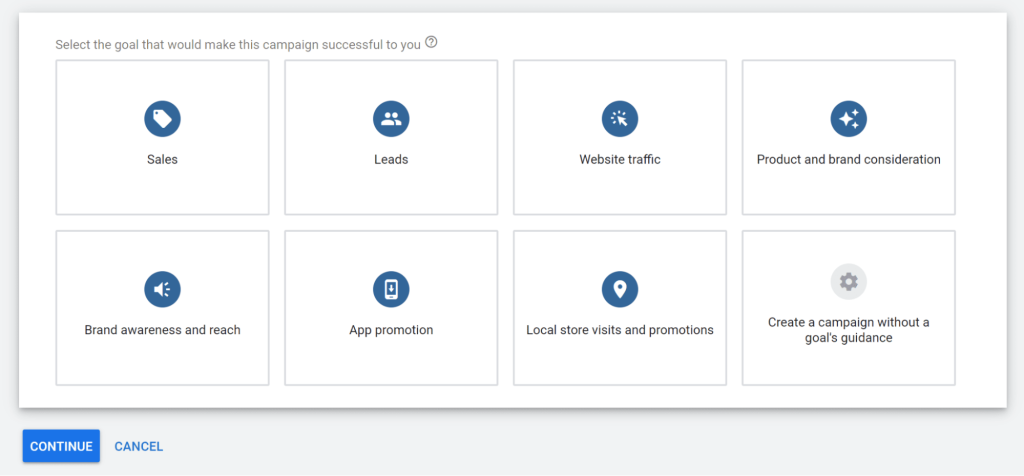
Select “Hotel” as your campaign type and click “Continue”.
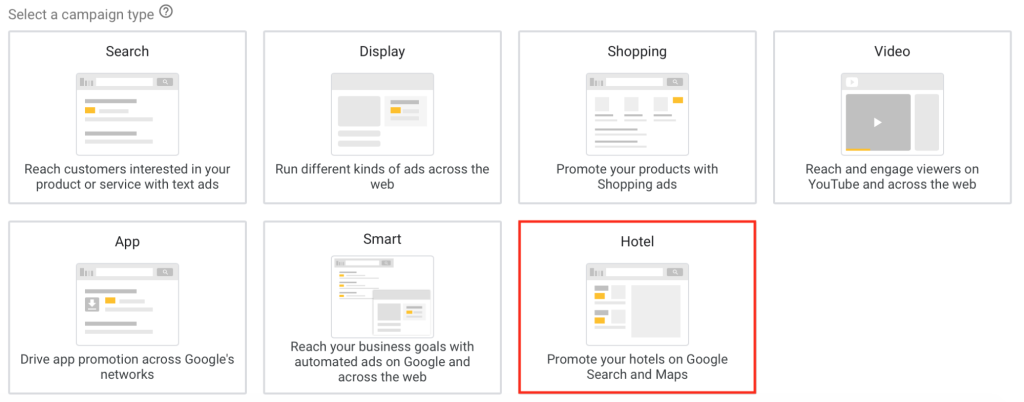
Step 5: Manage your budgets and bidding strategy
After your campaign is set up, you’ll need to manage budgets. This involves setting how much you’re willing to pay for each click on your ad and determining your overall advertising budget.
About bidding strategy for hotel campaigns, you can either bid when someone completes a booking or when they click on your ad:
- Commission (per conversion): You pay only when a traveler books your hotel, depending on the payment model you choose.
- Commission (per stay): You pay only when a traveler completes their stay booked via hotel ads.
- Max CPC bid (fixed or percent): You only pay when a traveler clicks on your ad. For the CPC bid strategies, you can adjust your bid based on factors such as device type, traveler location, length of stay, and other factors.
- Enhanced CPC (ECPC): Automates bid adjustments for a Max CPC bidding strategy.
Step 6: Create ad groups and set up ads
- Ad groups: Organize your campaign into ad groups based on specific themes or promotions (for example, “Luxury Suites” or “Family-Friendly Rooms”).
- Set up ads: Within each ad group, you’ll create individual hotel ads. Here’s where you craft compelling headlines and descriptions to showcase your property’s unique selling points. Include high-quality photos and highlight key amenities like on-site restaurants or spa services.
- Landing pages: Ensure your ads link to relevant landing pages on your hotel website, providing a seamless booking experience for potential guests.
Step 7: Monitor and optimize your Hotel ad campaign
Finally, once your campaign is live, you’ll need to monitor its performance and make any necessary adjustments. This could involve changing your bids, tweaking your ad copy, or adjusting your targeting settings.
Furthermore, for hotels aiming to launch campaigns swiftly without the complexities of account setup , you should consider Mega Digital’s Google Ads Agency Account Rental service and get immediate access to pre-verified accounts and dedicated support!
Mega Digital’s Pro Tips for Optimizing Google Ads for Hotels
Google Hotel Ads have become a crucial part of the digital marketing strategy for hotels. Here are some pro tips from Mega Digital to help you make the most of your Google Ads for hotels:
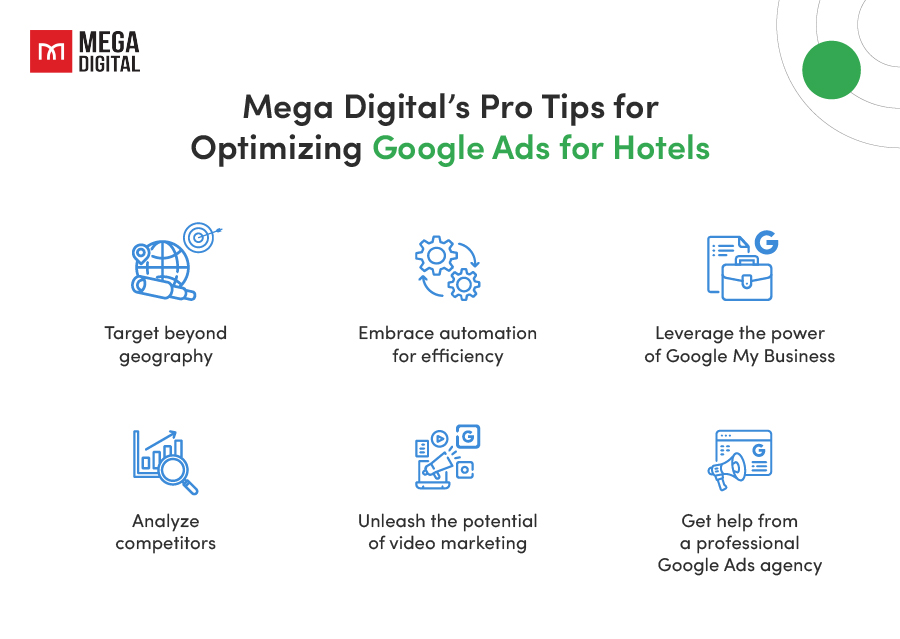
1. Target beyond geography
While location targeting is crucial, go beyond just cities or regions. Leverage Google’s advanced features to target specific neighborhoods, and areas around popular landmarks, or even target competitor locations to reach potential guests actively considering nearby options. Additionally, consider demographics and psychographics. Understanding the typical guest who books with your hotel allows you to tailor your ad copy and visuals to resonate with those specific profiles, whether it’s families seeking spacious accommodations or adventurous travelers drawn to outdoor activities.
2. Embrace automation for efficiency
Don’t waste time manually adjusting bids. Utilize Google’s automated bidding options like “Maximize Conversions” or “Target CPA” to optimize your bids in real-time based on data and maximize return on ad spend. Additionally, ensure seamless integration between your Hotel Center account and your hotel’s property management system (PMS). This ensures automatic updates on rates, availability, and promotions, streamlining campaign management.
3. Leverage the power of Google My Business
Your Google My Business listing acts as a digital storefront for your hotel. Optimize it by including high-quality photos, detailed descriptions with relevant keywords, and accurate contact information. Encourage satisfied guests to leave positive reviews, building trust and credibility for potential bookers. Take advantage of Google My Business posts to showcase limited-time promotions or seasonal packages. This grabs attention and drives bookings directly through your website.
4. Analyze competitors
Use the Google Ads Library to research your competitors’ advertising strategies. Analyze their messaging, visuals, and targeting approaches to gain insights and identify areas where you can differentiate your own ads.
5. Unleash the potential of video marketing
Craft captivating video ads for YouTube that showcase your hotel’s unique atmosphere, amenities, and surrounding attractions. Utilize targeted placements on relevant travel channels to reach potential guests actively researching destinations and inspire them to choose your property. Consider integrating high-quality virtual tours within your hotel website. This allows potential guests to explore your property virtually and experience its offerings firsthand, fostering a sense of connection even before they book.
6. Get help from a professional Google Ads agency
Consider partnering with a Google Premier Partner agency specializing in hospitality advertising, such as Mega Digital. They can provide valuable expertise to set up and manage your Google Hotel Ads campaigns effectively.
3 Best Google Hotel Ads Examples
1. Make it clear what guests can expect
Consider crafting ad copy that aligns with the interests and needs of your target audiences. Take Sunny Lodge as an example. It acknowledges the surf subculture of Southern California and includes a dedicated link to surf spots, thereby establishing its authority in this niche. The ad further highlights key hotel amenities such as contactless check-in, complimentary wifi, and access to the beach.

2. Leverage local attractions & sights
Target guests who are seeking hotels near local attractions by highlighting the convenience of staying at your property. For instance, the ad below was created to appeal to website visitors searching for a ‘nice hotel near Banff National Park’. This ad emphasizes its prime location and features activities relevant to the area such as hiking trails and thermal pools.

3. Include special offers in your ad copy
Experiment with various incentives in your ad copy to encourage travelers to make direct bookings, such as offering a free welcome drink or meal. Consider implementing diverse packages to boost revenue. For instance, you could offer a deal where a guest receives a complimentary cocktail and meal, but only if they book a suite.

Wrap up
In the current digital era, Google Hotel Ads are vital as travelers frequently use mobile devices for accommodation searches and bookings. They are a key part of a hotel’s digital strategy, leveraging Google’s extensive reach and real-time capabilities.
By utilizing Google Ads for hotels, you can expand reach, drive direct bookings, optimize their marketing spend, and stay competitive in the online travel market.







